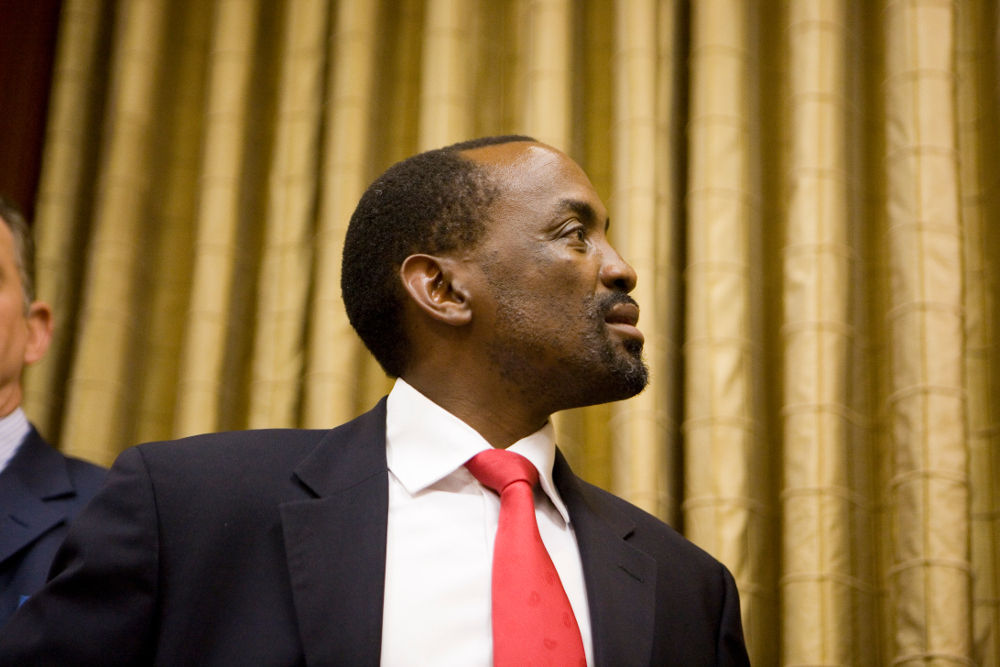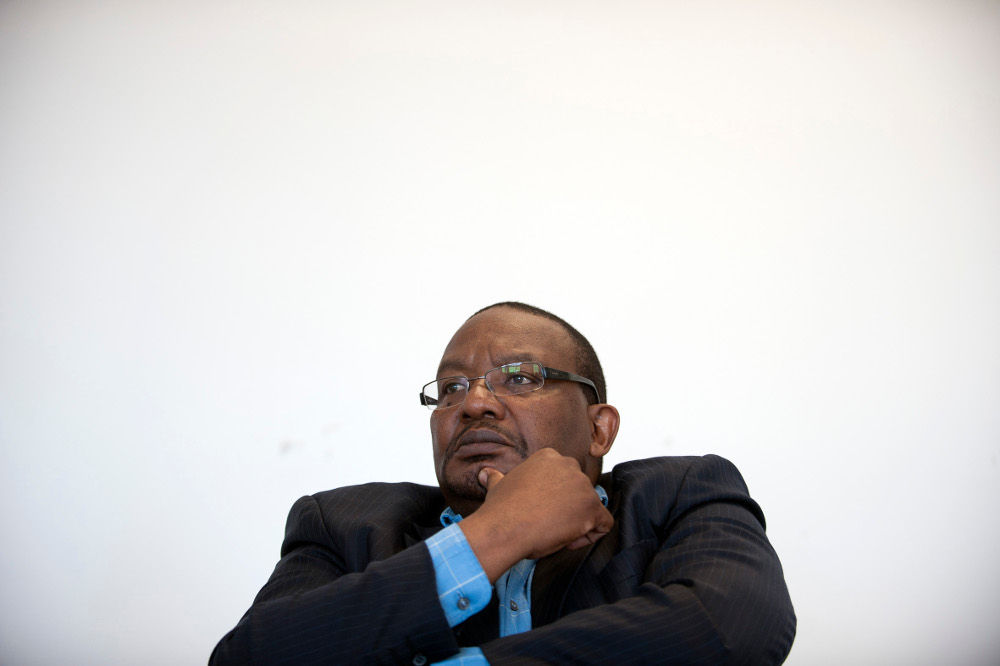Bulelani Ngcuka
In October 2013, just after national director of public prosecutions Mxolisi Nxasana took office, opposition MP Dene Smuts made a prophetic statement.
Speaking in the wake of a media leak revealing that the new NDPP did not have a security clearance, Smuts said: “If Mr Nxasana is the good man we hope he is, he won’t last – they will find a way to sack him.”
The question of whether or not Nxasana is a good man has just got a lot more complicated – but his future has been placed in doubt not because he is bad, but because he is perceived as a threat. The ANC elite, especially its current president, has a difficult relationship with money and, therefore, the law.
That reality has made the NDPP one of the most politically powerful and contested positions in government. The 1996 constitutional provision establishing a national “super attorney general” was controversial because of the power concentrated in one individual.
Bulelani Ngcuka, appointed as the first NDPP in 1998, was regarded – and feared – as a protégé of president Thabo Mbeki. Ngcuka acknowledged the political nature of his post in 2004: “A politically independent director of public prosecutions is wishful thinking.”
Augmented power
The formation of the Scorpions augmented that power – bringing with it the ability to investigate as well as to prosecute. But the intense factionalism that emerged in the ruling party, combined with the criminal vulnerability of its leading lights, placed unsustainable and destructive political pressures on the office of the NDPP.
Those offered this poisoned chalice have faced the choice of political compliance – in violation of their oath of office – or resistance. Not a single NDPP has survived.
Soon after assuming office, Ngcuka was confronted with the arms deal and how competing party factions abused it to further their interests.
Against the advice of his prosecutors, he chose to charge Schabir Shaik and let Jacob Zuma off the hook, apparently anticipating that Zuma would go into retirement. What a political miscalculation that was.
When Ngcuka left he had become a focus of a dirty tricks campaign driven by the Zuma faction, which sought not only to discredit him but also to destroy the Scorpions.
That didn’t happen until the interests of both factions coalesced in a perfect storm for Ngcuka’s successor, Vusi Pikoli. Not only had Pikoli opted to re-charge Jacob Zuma, he also backed his Scorpions investigators to charge Mbeki’s remaining powerful ally, police commissioner Jackie Selebi.
Reaction
Mbeki reacted by suspending Pikoli and ordering an inquiry into his fitness for office. It didn’t save Selebi or Mbeki, but it took Pikoli out of play at a crucial time for Zuma’s comeback.
Significantly, the office of the NDDP – and his closest lieutenants – remained a target for manipulation based on political or personal pressure, and fuelled by abuses of the security apparatus.
Crime intelligence spied on Scorpions boss Leonard McCarthy – an Mbeki loyalist – on Bulelani Ngcuka and even, anecdotal evidence suggests, on Mokotedi Mpshe, the acting NDPP appointed by Mbeki in Pikoli’s stead.

Menzi Simelane’s tenure was eventful and fraught. (Samantha Reinders, M&G)
These “spy tapes” were then leaked to Zuma’s lawyer, who used their contents to petition Mpshe successfully to withdraw charges against Zuma. The portion of the tapes disclosed by Mpshe was not conclusive, but showed the corrosive effect of political considerations on decision-making within the National Prosecuting Authority (NPA).
Transcripts showed McCarthy discussing the timing of re-charging with Ngcuka – who no longer had any role in the NPA – against the backdrop of Zuma’s looming showdown with Mbeki at the ANC’s Polokwane conference.
Nudge in the right direction
Rumours suggest other recordings might also have been used by Zuma backers to nudge senior members of the NPA in the right direction. Mpshe also terminated the criminal investigation of Mac Maharaj, relating to payments he had received via Schabir Shaik.
Finally, Mpshe also ended the disciplinary case against senior state advocate Nomgcobo Jiba, who, with colleague Lawrence Mrwebi, had become embroiled in efforts by crime intelligence to counter the Scorpions, particularly the agency’s Gauteng boss, Gerrie Nel.
Significantly, Gauteng crime intelligence head Richard Mdluli emerged as a key backer of Jiba. All three – Jiba, Mrwebi and Mdluli – were to play a starring role in what might be described as a golden age of political accommodation.
With the departure of Mbeki, Zuma’s ANC opted to snub the demonstrable independence of Pikoli – whose reputation had survived the Frene Ginwala inquiry.
Instead they appointed as the new NDPP Menzi Simelane, previously the director general of the justice department, whose performance at the Ginwala inquiry had demonstrated his bureaucratic obedience.
Different view
Ginwala had taken a different view, expressing her displeasure with Simelane’s testimony, which she found “in many respects to be inaccurate or without any basis in fact and law”.
That was enough for the Supreme Court of Appeal (SCA) to overturn his appointment by the president.
There came a long and fruitful interregnum under Jiba, whom Zuma appointed as the acting NDPP in December 2011, following the SCA’s ruling.

Vusi Pikoli’s time at the top was just as eventful. (David Harrison, M&G)
Mrwebi – with the apparent backing of Jiba – was instrumental in parrying efforts by the Hawks to try Mdluli for fraud relating to alleged abuses of the crime intelligence division he was heading.
Mdluli had declared his personal allegiance to Zuma in correspondence addressed to the president. The letters surfaced in the wake of his being charged for a long-dormant murder case unrelated to the fraud matter.
Driving personality
Jiba also suspended commercial prosecutor Glynnis Breytenbach, who was the driving personality behind the Mdluli fraud investigation.
Jiba also appeared to facilitate the interminable legal challenges mounted by Zuma’s lawyers to block the release of the spy tapes, which the Democratic Alliance was seeking to obtain to bolster its court case to reinstate Zuma’s corruption charges.
The president replaced Jiba – with Nxasana – at the end of August 2013, rushing to meet a deadline set by an undertaking to the Constitutional Court.
By some accounts, Nxasana was not what everyone expected.
NPA staff said Jiba was shocked by his hostility towards her – and he appointed as his spokesperson Nathi Ngcube, a man who had clashed openly with Mrwebi.
Almost immediately following his appointment, his enemies inside the NPA started a search for dirt they could throw at him. What they have apparently found might be worrying.
Really shocking, though, is the realisation that if he had behaved as was expected of him, that history would likely have been kept buried.
* Got a tip-off for us about this story? Click here.

The M&G Centre for Investigative Journalism (amaBhungane) produced this story. All views are ours. See www.amabhungane.co.za for our stories, activities and funding sources.